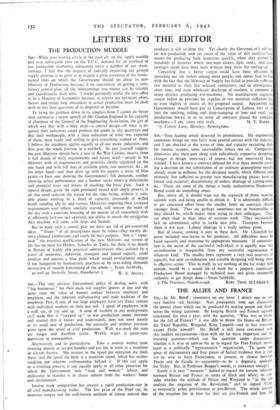SIR,—The very obvious Government policy of dealing soleh with "
big businesses " for their main war supplies ignores at one and the same time the value of human contact between employer and employee, and the inherent craftsmanship and trade tradition of the employee. Few, if any, of our large employers have any direct contact with individual workers on their pay roll. I speak of employers with a staff, say, of 15o and up. A team of workers in any multiprocess civil trade that is " stepped up" to war production under foremen and control that it knows and understands, does not work merely at its usual rate of production, but naturally and without pressure gains upon the speed of civil production. With war-work the runs are longer and therefore easier. Weekly wages at piece-rates appreciate in consequence.
Alternatively and to particularise. Take a woman worker from rivetting shovels or tea-pot handles and put her to work in a munition or aircraft factory. She retreats to the speed per operation she finds there, and the speed she finds is a munition speed, which has neither tradition nor inherent craftsmanship behind it. If this can apply to a rivetting process, it can equally apply to all other processes for which the Government seek " man and woman " labour, and endeavour to transfer it to places remote from the workers' home and environment.
Intense trade competition has created a rapid production-rate in all civil manufacturing trades. The low price of the Ford car, its immense output and the well-known methods of labour control that produces it will colfirm this Yet clearly the Government's advises on war-production took no count of the value of this ready-at-hand means for producing bulk quantities quickly, when they passed by hundreds of factories where one-man planes, light tanks, and gun. carriages could have been built without long waits for tooling-up.
Conceding that a better cutput could have been obtained by spreading out the orders among more people, one comes face to face with the fact that the Ministry of Supply has failed to provide sufficient raw material to their few selected contractors, and in consequence, short time, and even wholesale discharge of workers, is common in many districts producing war-machines. No manufacturer organises output before he provides for supplies of raw materials sufficient for, or even slightly in excess of, his proposed output. Apparently the Government should have put its Conscription of Labour first of all into the' smelting, rolling and drop-stamping of iron and steel, and production forced so as to cover all contracts placed for complete


























 Previous page
Previous page